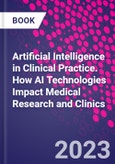Artificial Intelligence in Clinical Practice: How AI Technologies Impact Medical Research and Clinics compiles current research on Artificial Intelligence within medical subspecialties, helping practitioners with diagnosis, clinical decision-making, disease prediction, prevention, and the facilitation of precision medicine. The book defines the basic concepts of big data and AI in medicine and highlights current applications, challenges, ethical issues, and biases. Each chapter discusses AI applied to a specific medical subspecialty, including primary care, preventive medicine, general internal medicine, radiology, pathology, infectious disease, gastroenterology, cardiology, hematology, oncology, dermatology, ophthalmology, mental health, neurology, pulmonary, critical care, rheumatology, surgery, and OB-GYN.
This is a valuable resource for clinicians, students, researchers and members of medical and biomedical fields who are interested in learning more about artificial intelligence technologies and their applications in medicine.
Table of Contents
1. Artificial Intelligence in Primary Care 2. Artificial Intelligence in General Internal Medicine 3. Artificial Intelligence Devices and Assessment in Medical Imaging 4. Artificial Intelligence in Pathology 5. Artificial Intelligence in Clinical Microbiology 6. Artificial Intelligence on Interventional Cardiology 7. Artificial Intelligence in Heart Failure and Transplant 8. Artificial Intelligence in Hematology 9. Artificial Intelligence in Oncology 10. Artificial Intelligence in Ophthalmology I: Retinal Diseases 11. Artificial Intelligence in Ophthalmology II: Glaucoma 12. Artificial Intelligence in Ophthalmology III: Systemic Diseases 13. Artificial Intelligence in Respiratory Medicine 14. Artificial Intelligence in Critical Care 15. Artificial intelligence in Dermatopathology 16. Artificial Intelligence in Infectious Diseases 17. Artificial Intelligence in Neglected Tropical Diseases 18. Artificial Intelligence in Psychiatry: Current Practice and Major Challenges 19. Application of Artificial Intelligence Frameworks in the Clinical Practice of Neurology: Recent Advances and Future Directions 20. Artificial intelligence in Rheumatology 21. Artificial Intelligence in Endocrinology 22. Artificial Intelligence in Sleep Medicine 23. Artificial Intelligence in Nephrology 24. Artificial intelligence in Surgery 25. Artificial Intelligence in Cardiothoracic Surgery: Current Applications and Future Perspectives 26. Artificial Intelligence in Orthopedics 27. Artificial Intelligence in Plastic Surgery 28. Artificial intelligence in Obstetrics and Gynecology 29. Artificial Intelligence in Urology 30. Artificial Intelligence in Neurosurgery A Focus on Neuro-oncology 31. Artificial Intelligence in Vascular Surgery 32. Artificial Intelligence in Neonatal and Pediatric Intensive Care Units 33. Artificial Intelligence in Pediatrics 34. Artificial Intelligence in Pediatric Congenital and Acquired Heart Disease 35. Artificial Intelligence in Anesthesiology 36. Artificial Intelligence in Emergency Medicine 37. Artificial Intelligence in Allergy and Immunology 38. Artificial Intelligence in Medical Genetics 39. Artificial Intelligence in Healthcare: A Perspective from Google 40. Artificial Intelligence Drives the Digital Transformation of Pharma 41. Artificial Intelligence in Regulatory Decision-Making for Drug and Biological Products 42. Artificial Intelligence Applications in Toxicology 43. Artificial Intelligence in Adverse Drug Events 44. Artificial Intelligence in Mass Spectrometry-based Proteomics 45. Artificial Intelligence in Global Health 46. Legal Aspects of Artificial Intelligence in Medical Practice 47. Socioeconomic Bias in Applying Artificial Intelligence Models to Health 48. Artificial Intelligence in Dermatology 49. Artificial Intelligence in Gastroenterology and Hepatology 50. Artificial Intelligence in Nutrition Research 51. Artificial Intelligence in Cardiac Electrophysiology








